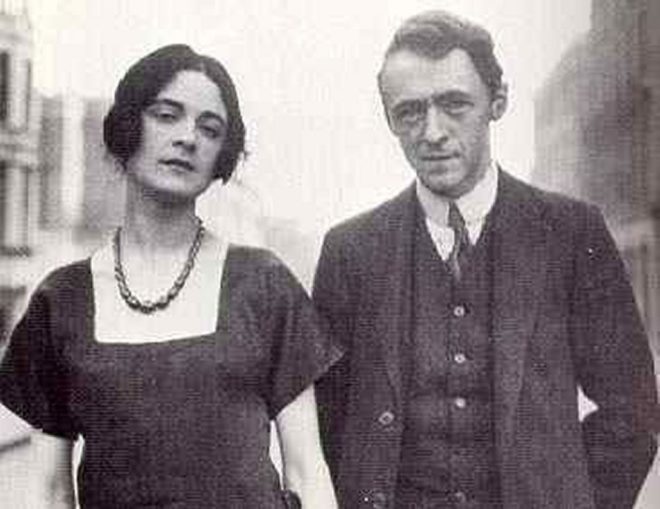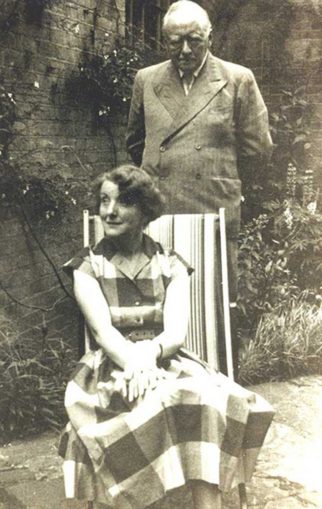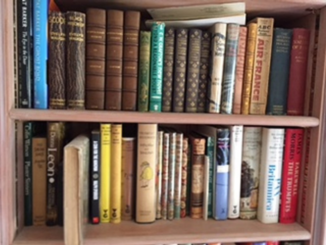
There have been quite a few occasions when one wished one was a fly on the wall to listen in on a conversation. The private discussion between Sir Arnold Bax, Master of the King’s Musick, and his long time mistress and concert pianist, Harriet Cohen, sometime in the spring of 1948 must have been a corker. Let me give you a little bit of background history so that you can imagine the full flavour of the discourse that must have ensued and the revelation that Arnold sprung on the unsuspecting Harriet on that fateful day.
Arnold Bax was born in 1883 into a fairly wealthy family and his childhood was spent in a large house called Ivy Bank close by Hampstead Heath. He and his brother Clifford were privately taught by a live-in tutor and it wasn’t long before Arnold showed great prowess at the piano. By the time he was 17 he was enrolled into the Royal Academy of Music and quickly began to compose, gaining much kudos for the quality of the compositions which by 1905 were gaining public performances. It was about this time that he visited Russia and Ireland and became emotionally infatuated with Celtic legends – a theme that was to run through much of his compositions until the end of his life. He was to become a close friend of Yeats, Pearse, A.E. and many others in the Dublin literary set pre-1916. He taught himself Gaelic and had a number of books, poetry and short stories, published under the pseudonym of Dermot O’Byrne. The violence of the Easter Rising and the British response shocked him immensely and at least one of his poetry collections was banned from sale on the U.K. mainland. Ireland remained his spiritual home for the rest of his life and it was poetic in the extreme that his last days were spent in the south-west peninsula around Cork.
Despite a number of romantic affairs in Russia and among the fellow students at the Royal Academy of Music he finally married in 1911. Elsita was the daughter of a neighbour in Hampstead and despite quickly fathering two children he realised that his nomadic lifestyle was seriously unsuited to parenthood. Just two years later Arnold met the entrancing 17 year old Harriet Cohen – an accomplished pianist – and the flame of a love affair quickly ignited. Elsita could not have been blind to the relationship – letters were flowing backwards and forwards between Arnold and Harriet on a daily basis – but she refused to allow Arnold a divorce on the grounds that she was a Roman Catholic and with a somewhat misguided belief that she would eventually be able to “make Arnold come to his senses”. One might also argue that it suited Arnold as much to remain “married” in that it allowed him not to legally commit himself to any other. As we will see, Arnold’s eye for the ladies was busy and wide-ranging.
Perhaps Arnold Bax’s most famous orchestral piece, Tintagel, was written in 1917 when he was persuaded by Elsita to holiday with her and the children in St.Merryn, Cornwall. The real truth was that Arnold only agreed to this because Harriet Cohen was staying in Tintagel at the same time and he saw an opportunity for some clandestine meetings. For the duration of the holiday Arnold lived in a small cottage away from the main house where his family slept and every other day would slip away to meet up with Harriet. If Elsita was aware of the liaisons remains unclear but the emotional stress that Arnold endured can clearly be heard in the Tintagel music which is flushed through with romantic and erotic longing. By the end of the war Elsita had finally been cast off, housed by Arnold and at his expense in Golders Green until the end of her life in 1947. Harriet Cohen was to become his confidante, amanuensis and lover until the day he died. But never his wife, a status that was to be the catalyst for the volcanic row hinted at the start of this little essay.
Arnold began to write music for Harriet and in return Harriet developed a possessive and ultimately corrosive influence on Arnold’s career as a composer in the hope that he would be taken seriously by the musical cognoscenti. While she did much to promote his work both here and abroad there came a point in the 40’s when her overarching enthusiasm and her diminishing skills as a concert pianist began to turn promoters away. Arnold himself, intensely private and publicly unassuming, could do little to suppress Harriet’s counter intuitive banging of the Bax drum. Arnold continued to be peripatetic, travelling between Glencolumcille in Ireland, Morar in Scotland, Dublin, London and Sussex. Although he bought a property for Harriet in London he only occasionally stayed there if he was attending a concert or doing business in London. By 1939 he had more or less finished composing – the seventh symphony published that year is an elegiac “farewell to music” stating that “I have no more to say” – and he ensconced himself in a room at The White Horse pub, Storrington, Sussex where he was to live out the last 13 years of his life, playing draughts, doing crosswords and generally enjoying drinks with the locals. He had been knighted and in 1940, somewhat inexplicably he had been made Master of the King’s Musick, a role for which he was eminently unsuitable. He managed to knock out some music for the films Malta GC and Oliver Twist as well as provide fanfares for the wedding of the Queen and Prince Phillip but, as he himself admitted, it was third-rate fare refashioned from earlier pieces. And then in 1947, Elsita died and an astonishing revelation finally comes to light.

Picture if you can that spring day in 1948 at Harriet’s London flat and Arnold finally telling Harriet that he would not be marrying her and thus make her Lady Bax – a title she had wanted ever since Arnold had been knighted. And then boom! – he also tells her that for nigh on 20 years he has had a second mistress, Mary Gleaves, who had accompanied him on many of his trips to Scotland and Ireland and who he had bought a house for just round the corner from the Storrington pub in which he resided. The row that ensued was, by all accounts, monumental. Arnold had even written to Mary to say that although he hadn’t planned to propose to anyone if he actually did it would be to her, Mary. One has to feel slightly sorry for Harriet. Despite her possessiveness and rather scratchy temperament she had spent half a lifetime promoting her lover and his music around the globe and now, at the last gasp, when she thought a promotion into the upper echelons of society was attainable, it had been snatched away from her. Two weeks after this row she had an “accident” with a tray of glasses she was carrying and cut the nerves in the wrist of her right hand. Surmise as you may.
Arnold slipped into a sedentary life at Storrington enjoying sipping beer and whisky with the locals and visiting with Mary at her house not far away from the pub. His once slight figure blossomed outwards and there were a number of occasions at which old friends worried about his drinking. It is no surprise to discover that Arnold visited Jack Moeran (see my little essay The Strange Death of Jack Moeran) in Kenmare, Co. Kerry and were often to be found drinking together in the local bars. Undoubtedly during his last years Arnold was much closer to Mary Gleaves than he was to Harriet and his last two letters to Mary written four days before he died in Cork in 1953 were affectionate in the extreme: “…but I want to come back to you and your welcoming arms. I imagine all of you close to me and can almost feel your ‘bod’ warm against mine. Ever my love, my dear and darling.” Complications with Arnold’s will, even though he had split much of his estate between Harriet and Mary meant that Mary didn’t receive a single penny until after Harriet’s death some 17 years later. Immediately after Arnold’s memorial service at St. Martin-in-the-Fields Harriet drove down to the White Horse pub in Storrington and collected all Arnold’s musical scores and papers claiming that she was the rightful heir. The subsequent decline in Bax’s public performances can be attributed in part to Harriet’s possessiveness and refusal to allow any of his chamber and piano works to be performed unless she was the pianist. As her pianistic star had waned considerably it was inevitable that Bax dropped off the concert programming and it was only after Harriet’s death and a belated recognition that a fine British composer had been neglected for too long that Lyrita Recording Label were able to bring out a complete set of his seven symphonies, followed more recently by Chandos and Naxos.
The British Library hold all the letters from Bax to Harriet – some 1500 – as well as a substantial number of photographs which would indicate that Arnold and Harriet enjoyed what appears to be a vigorous love life, disporting themselves naked on quiet beaches and lonely country spots. There is a Ken Russell film which you can find on Youtube in which Russell himself plays Bax and with Glenda Jackson in her last film role before becoming a politician playing Harriet Cohen. I cannot recommend it but if you must, go ahead and view.
© Roger Ackroyd 2019
The Goodnight Vienna Audio file
Audio Player


